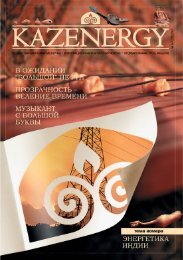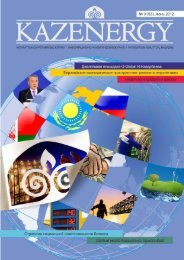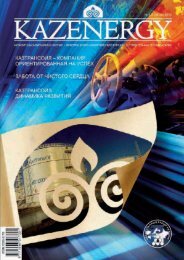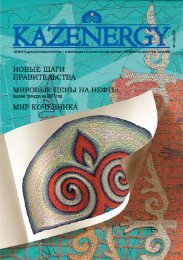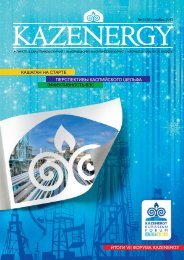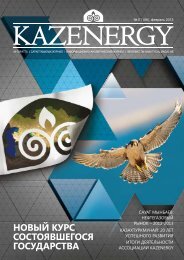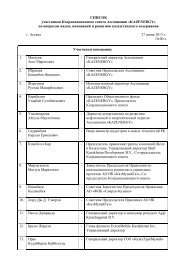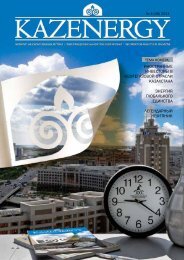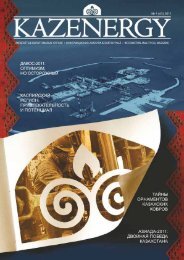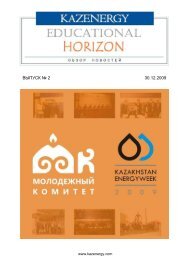September 2010|1 - KazEnergy
September 2010|1 - KazEnergy
September 2010|1 - KazEnergy
Create successful ePaper yourself
Turn your PDF publications into a flip-book with our unique Google optimized e-Paper software.
prOfESSiONal<br />
|<br />
tional program. Its future projects will assume<br />
greater involvement of future specialists in science,<br />
and offer broader opportunities for identifying<br />
innovative, breakthrough ideas that are<br />
useful for the development of Kazakhstan’s<br />
economy.<br />
We have already started gathering information<br />
on innovative research, specifically projects<br />
relevant to the oil-gas and energy industries.<br />
In this case, the Association will rely, as before,<br />
on open competitions. Candidates who qualify<br />
to apply for our scholarships and grants are<br />
registered students, graduate students, undergraduates,<br />
doctoral students, researchers,<br />
university professors and industry employees<br />
with scientific interests.<br />
– Why do colleges, professional schools<br />
and universities in Kazakhstan<br />
experience diffculties in competing with<br />
their foreign counterparts?<br />
– The reason for this is that they have long<br />
been separated from enterprises, closed to the<br />
outside world, and disengaged from applied<br />
research. It is business that connects academic,<br />
research and business activities. Educational<br />
institutions still lack stable ties with customers<br />
and clients of educational services. KAZEN-<br />
ERGY Educational program aims to meet the<br />
precise challenges of creating these ties: to enable<br />
professional schools, colleges, and higher<br />
education institutions to “break through” to<br />
the innovative economy, to modern technologies<br />
of education and science.<br />
“gOlD STaNDarD” Of ThE prOfESSiON<br />
– In oil companies with foreign participation,<br />
conflicts frequently arise from the fact<br />
that Kazakhstani employees feel undervalued<br />
in comparison with foreigners,<br />
who refer disparagingly to differences in<br />
qualifications. Do you think this situation<br />
will change once Kazakhstan’s industrial<br />
and innovative development is assisted<br />
by its own personnel? And how it should<br />
change?<br />
– In my opinion, this is a bilateral process. On<br />
the one hand, the salaries of Kazakhstani and<br />
foreign employees occupying the same position<br />
should be adjusted. As one way of solving<br />
this problem, the Association organizes internships<br />
for Kazakhstani personnel in foreign<br />
companies.<br />
The difference between salaries and qualifications<br />
is only the “visible” aspect of the issue.<br />
The real reason lies elsewhere, in the vacuum<br />
between the educational system and real<br />
economy - that is, the discrepancy between<br />
educational standards and the requirements<br />
of employers. There is no system of professional<br />
standards, no National Qualification<br />
System to build a bridge between theory and<br />
practice. The absence of a National Qualification<br />
System - the system that assesses professional<br />
qualifications – disguises the changes<br />
ThE abSENCE Of a NaTiONal qualifiCaTiON<br />
SySTEm - ThE SySTEm ThaT aSSESSES<br />
prOfESSiONal qualifiCaTiONS – DiSguiSES<br />
ThE ChaNgES ThaT havE OCCurrED iN thE<br />
NAtuRE of pRofEssioNs duRiNG thE YEARs of<br />
iNdEpENdENcE.<br />
that have occurred in the nature of professions<br />
during the years of independence. Some jobs<br />
have become obsolete, while others have appeared.<br />
Both the ownership structure, and<br />
what is expected and required of employees<br />
have changed. Production has become much<br />
more technologically advanced and innovative<br />
than it was 10-20 years ago. And in order<br />
to ensure that our personnel meet the industrial-innovative<br />
development of the country,<br />
we should be aware of their real readiness for<br />
change.<br />
It is generally acknowledged nowadays that<br />
NQS is necessary. An example of this is the<br />
establishment of a Working group composed<br />
of representatives of the Ministry of Education<br />
and Science, the Ministry of Labour and Social<br />
Protection, “Atameken” National Economic<br />
Chamber, and EU experts.<br />
– In turn, the question arises: who should<br />
certify employees’ qualifications to ensure<br />
an objective, fair and generally accepted<br />
result?<br />
– The certification of specialists is also one of<br />
the main elements of the National Qualification<br />
System. In my opinion, the certification should<br />
take place in specialized industry centers under<br />
the jurisdiction of organizations similar to<br />
our Association, where employers are able to<br />
participate in the development of assignments<br />
and in the work of qualifications commissions<br />
as independent experts.






